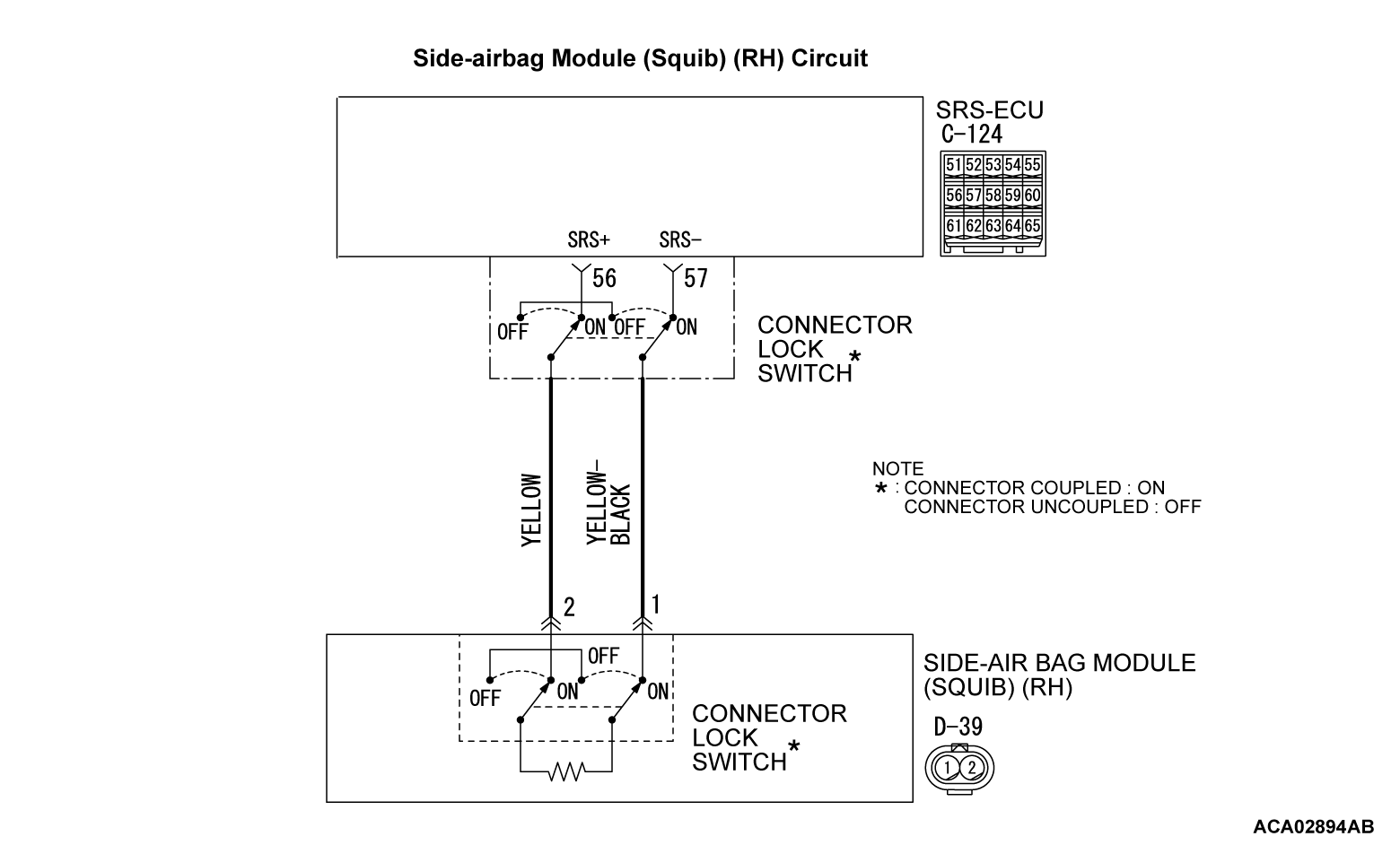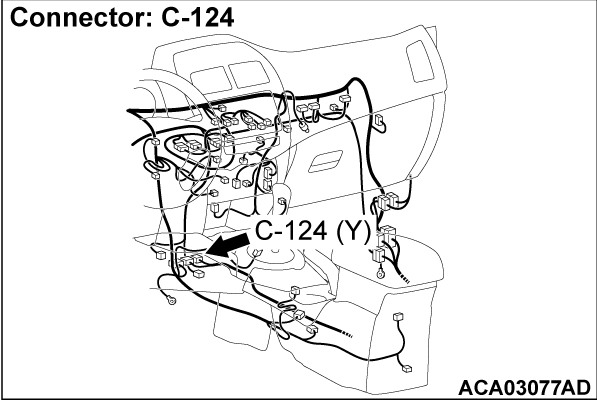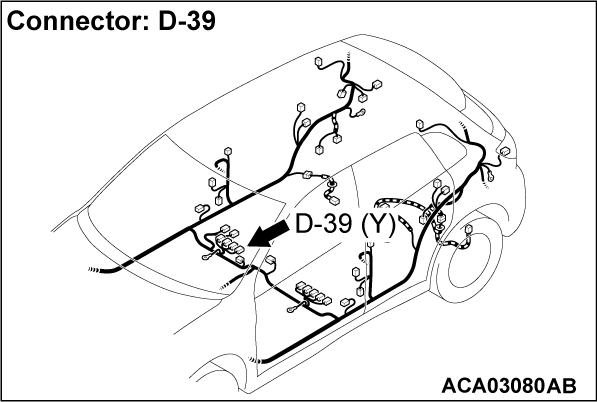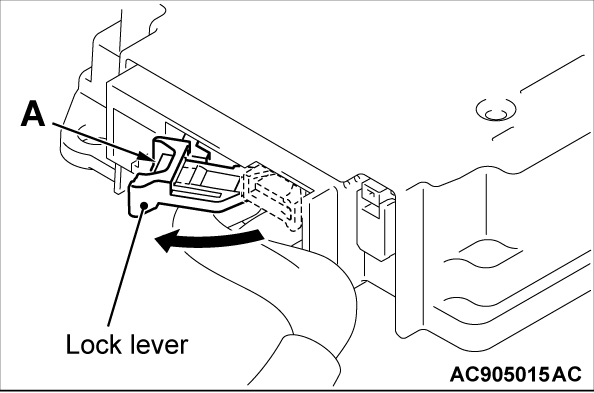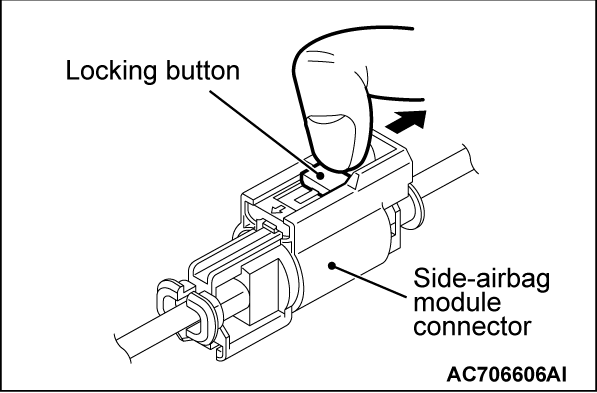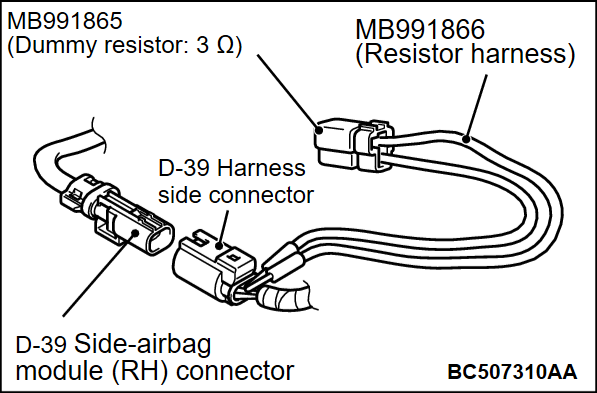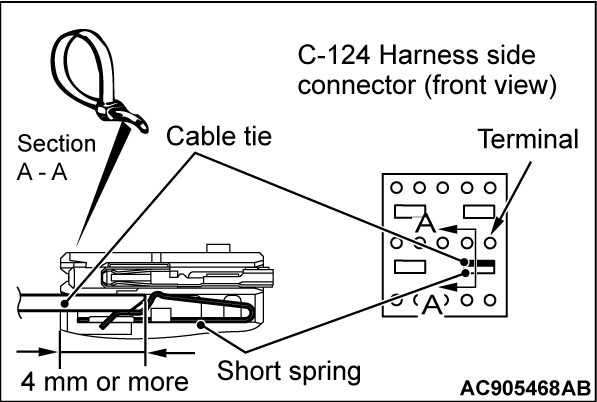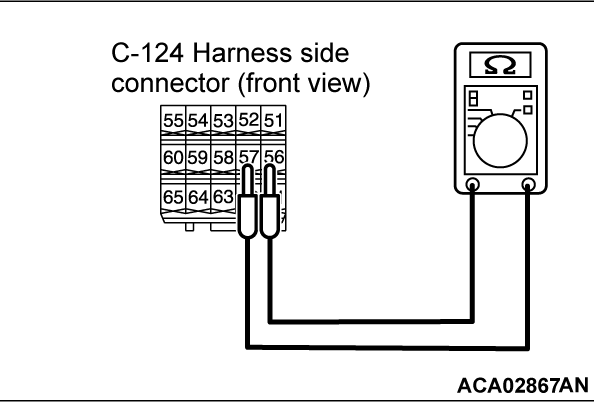DTC B1420: Side-airbag Module (RH) (Squib) System (Short Circuit between Squib Circuit Terminals)
| caution | If DTC B1420 is set in the SRS-ECU, always diagnose the CAN bus lines. |
CIRCUIT OPERATION
- The SRS-ECU judges how severe a collision is by detecting signals from the side impact sensor installed on the lower side of the center pillar. If the impact is over a predetermined level, the SRS-ECU sends an ignition signal. At this time, if the side collision safing G-sensor is on, the SRS air bag will inflate.
- The ignition signal is input to the side-airbag module to inflate the side-airbag.
DTC SET CONDITIONS
This DTC is set if there is abnormal resistance between the input terminals of the side-airbag module (RH) (squib).
TROUBLESHOOTING HINTS
- Improper engaged connector or defective short spring*
- Short between the side-airbag module (RH) (squib) circuit terminals
- Damaged connector(s)
- Malfunction of the SRS-ECU
DIAGNOSIS
STEP 1. Using scan tool MB991934, diagnose the CAN bus line.
(1)
| caution | To prevent damage to scan tool MB991934, always turn the ignition switch to the "LOCK" (OFF) position before connecting or disconnecting scan tool MB991934. |
(2) Turn the ignition switch to "ON" position.
(3) Diagnose the CAN bus line.
(4) Turn the ignition switch to the "LOCK" (OFF) position.
Is the check result satisfactory?
STEP 2. Recheck for diagnostic trouble code.
Check again if the DTC is set.
(1) Erase the DTC.
(2) Turn the ignition switch to "ON" position.
(3) Check if the DTC is set.
(4) Turn the ignition switch to the "LOCK" (OFF) position.
Is the DTC set?
STEP 3. Check SRS-ECU connector C-124 and side-airbag module (RH) connector D-39.
(1) Disconnect the negative battery terminal.
(2) While pushing the part "A" indicated in the figure of the harness side connector, turn the lock lever to the direction of the arrow to release the lock lever. After disconnecting the C-124 SRS-ECU connector, connect it again.
(3) Disconnect the D-39 side-airbag module connector, and then reconnect it. Unlock the connector by sliding the locking button to the direction of the arrow as shown in the figure, and then disconnect the connector.
(4) Connect the negative battery terminal.
(5) Erase the diagnostic trouble code memory, and check the diagnostic trouble code.
Is DTC B1420 out put?
 The procedure is complete. It is assumed that DTC B1420 set because connector C-124 or D-39 was engaged improperly.
The procedure is complete. It is assumed that DTC B1420 set because connector C-124 or D-39 was engaged improperly.STEP 4. Check the side-airbag module (RH).
(1) Disconnect the negative battery terminal.
(2) Disconnect the D-39 side-airbag module connector, unlock the connector by sliding the locking button to the direction of the arrow as shown in the figure, and then disconnect the connector.
(3) Connect special tool MB991865 to special tool MB991866.
(4)
| caution | Do not insert a test probe into the terminal from its front side directly, as the connector contact pressure may be weakened. |
Insert special tool MB991866 into the D-39 harness side connector by backprobing.
(5) Connect the negative battery terminal.
(6) Erase the diagnostic trouble code memory, and check the diagnostic trouble code.
Is DTC B1420 set?
STEP 5. Check the side-airbag module (RH) circuit. Measure the resistance at the SRS-ECU connector C-124.
(1) Disconnect the negative battery terminal.
(2) While pushing the part "A" indicated in the figure of the harness side connector, turn the lock lever to the direction of the arrow to release the lock lever, and disconnect the C-124 SRS-ECU connector.
(3)
Disconnect the D-39 side-airbag module connector, unlock the connector by sliding the locking button to the direction of the arrow as shown in the figure, and then disconnect the connector.
| danger | To prevent the air bag from deploying unintentionally, disconnect the side-airbag module (RH) connector D-39 to short the squib circuit. |
(4)
| caution | Insert an insulator such as a cable tie to a depth of 4mm (0.16 inch) or more, otherwise the short spring will not be released. |
Insert a cable tie [3 mm (0.12 inch) wide, 0.5 mm (0.02 inch) thick] between terminals 56, 57 and the short spring to release the short spring.
(5) Check for continuity between C-124 harness side connector terminals 56 and 57.It should be open circuit.
Is it open circuit?
STEP 6. Check the harness wires for short circuit between SRS-ECU connector C-124 (terminal No.56 and 57) and side-airbag module (RH) connector D-39 (terminal No.2 and 1).
Is the check result normal?
![[Previous]](../../../buttons/fprev.png)
![[Next]](../../../buttons/fnext.png)
